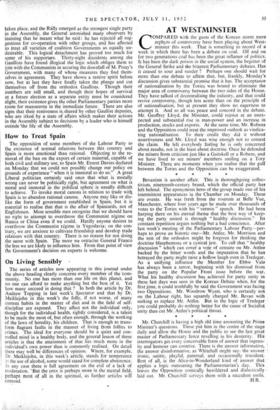- AT WESTMINSTER
COMPARED with the gusts of the Korean storm mere zephyrs of controversy have been playing about West- minster this week. That is something to record of a week in which there has been a debate on coal. Off and on for two generations coal has been the great inflamer of politics. It has been the dark poison in the social system, the begetter of the General Strike and the bitterest Parliamentary debates. Has it ceased to sour and sunder ? Perhaps one should wait for more than one debate to affirm that, but, frankly, Monday's discussion gives substantial promise that it has. The acceptance of nationalisation by the Tories was bound to eliminate the major area of controversy between the two sides of the House. They have talked of decentralising the industry, and that could revive controversy, though less acute than on the principle of of nationalisation, but at present they show no eagerness to attempt it. And so all was peace and concord in the debate. Mr. Geoffrey Lloyd, the Minister, could rejoice at an unex- pected and substantial rise in man-power and an increase in production, stocks and exports. At the same time, Mr. Robens and the Opposition could treat the improved outlook as vindica- ting nationalisation. To their credit they did it without assertiveness and Mr. Lloyd was wise enough not to contest the claim. He left everybody feeling he is only concerned about results, not in the least about doctrine. Once he defended the miners from criticism just like a Gaitskell or a Robens, and we have lived to see miners' members smiling on a Tory Minister. There are moments when you realise that the gulf between the Tories and the Opposition can be exaggerated.
s * * * Bevanism is another affair. This is thoroughgoing collec- tivism, nineteenth-century brand, which the official party has left behind. The eponymous hero of the group made one of his intermittent appearances in the Chamber on Monday. These are events. He was fresh from the rostrum at Belle Vue, Manchester, where four years _ago he made over thousands of votes to the Tories with his " vermin " speech. He had been harping there on his eternal theme that the best way of keep- ing the party united is through " healthy discussion." Its constant repetition argues nothing but a bad conscience. After last week's meeting of the Parliamentary Labour Party—per- haps to prove an historic one—Mr. Attlee, Mr. Morrison and the rest of the orthodox might be forgiven for thinking the doctrine blasphemous or a cynical jest. To call that " healthy discussion " which can cover a vote of censure on Mr. Attlee backed by the bitter words and the imputation that he has betrayed the party might raise a hollow laugh even in Tredegar. As a unifying influence the Member for Ebbw Vale has always been a terror, beginning with his dismissal from the party on the Popular Front issue before the war. What his healthy discussion has achieved for party unity in these last days was seen in the Korean Debate when, for the first jime, it could truthfully be said the Government was facing two Oppositions. Mr. Woodrow Wyatt, who is certainly not on the Labour right, has squarely charged Mr. Bevan with seeking to replace Mr. Attlee. But in the logic of Tredegar ' you could probably do nothing better for the cause of Socialist unity than cut Mr. Attlee's political throat.
f • * « _ Mr. Churchill is having a high old time answering the Prime Minister's questions. These put him in the centre of the stage daily and allow the House and the public to see the last great master of Parliamentary fence revelling in his dexterity. His interrogators get every conceivable form of answer that ingenu- ity and humour can contrive. There is the answer informative, 1 the answer disinformative, as Whitehall might say; the answer ironic, satiric, playful, paternal, and occasionally truculent. Best of all, is the Alice-in-Wonderland kind of answer that " applies a logic outsoaring the Parliamentarian's day. This leaves the Opposition comically bewildered and dialectically laid out. Mr. Churchill surveys them with a succulent smile.
H.B.







































 Previous page
Previous page